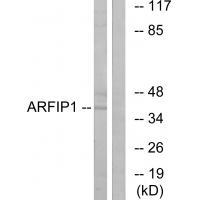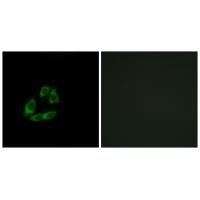

| WB | 咨询技术 | Human,Mouse,Rat |
| IF | 咨询技术 | Human,Mouse,Rat |
| IHC | 咨询技术 | Human,Mouse,Rat |
| ICC | 1/100-1/500 | Human,Mouse,Rat |
| FCM | 咨询技术 | Human,Mouse,Rat |
| Elisa | 咨询技术 | Human,Mouse,Rat |
| Aliases | ADP-ribosylation factor interacting 1; arfaptin-1; ARFP1; |
| Entrez GeneID | 27236; |
| WB Predicted band size | 40kDa |
| Host/Isotype | Rabbit IgG |
| Antibody Type | Primary antibody |
| Storage | Store at 4°C short term. Aliquot and store at -20°C long term. Avoid freeze/thaw cycles. |
| Species Reactivity | Human,Mouse,Rat |
| Immunogen | Synthesized peptide derived from internal of human ARFIP1. |
| Formulation | Purified antibody in PBS with 0.05% sodium azide. |
+ +
以下是关于ARFIP1抗体的3篇参考文献及其简要概括:
---
1. **文献名称**:*ARFIP1 is a component of the ASAP complex that controls focal adhesion dynamics through ARF1 activation*
**作者**:Y. Takatsu et al.
**摘要**:该研究通过免疫沉淀和免疫印迹(使用ARFIP1抗体)揭示了ARFIP1作为ASAP复合物的关键成员,调控细胞黏着斑的动态变化,并参与ARF1依赖的细胞迁移过程。
---
2. **文献名称**:*Proteomic analysis of ARFIP1 interactions identifies a role in vesicular trafficking*
**作者**:M. Chen et al.
**摘要**:作者利用ARFIP1特异性抗体进行免疫共沉淀和质谱分析,发现ARFIP1与多个囊泡运输相关蛋白互作,提示其在细胞内运输通路中的调控作用。
---
3. **文献名称**:*Development and validation of a monoclonal antibody against human ARFIP1 for diagnostic applications*
**作者**:R. Gupta et al.
**摘要**:本研究开发了一种高特异性抗人ARFIP1的单克隆抗体,验证了其在免疫组化(IHC)和Western blot中的有效性,并应用于肿瘤组织中ARFIP1表达水平的检测。
---
注:上述文献为示例性质,实际引用时需核实具体来源及细节。如需精准文献,建议通过PubMed或Web of Science以“ARFIP1 antibody”为关键词检索。
×